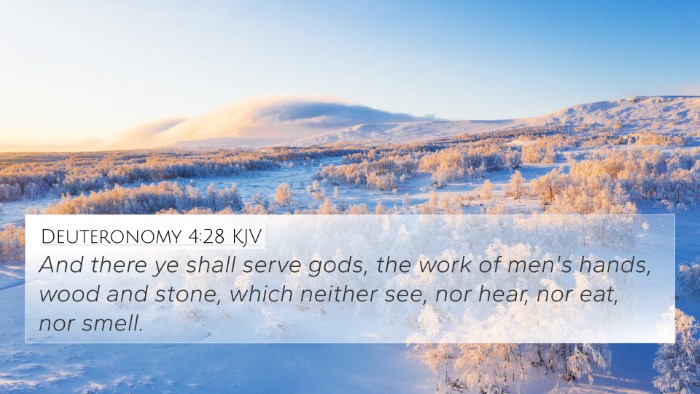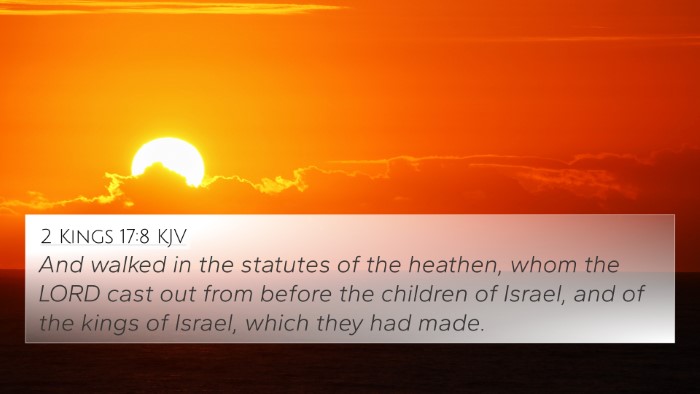Understanding 2 Kings 17:40
Verse: 2 Kings 17:40 - "Howbeit they did not hearken, but they did after their former manner."
Summary of Meaning
The verse highlights the persistent disobedience of the Israelites, reflecting their unwillingness to abandon old habits despite witnessing the consequences of their actions. This verse serves as a testament to human nature's resistance to change and the recurring themes of obedience and rebellion found throughout Scripture.
Commentary Insights
-
Matthew Henry:
Henry emphasizes the irony of Israel's situation. They were shown the true path through various warnings and judgments, yet they chose to revert to their previous ways. This demonstrates not just a failure to heed God's commands but a deep-seated inclination towards idolatry and disobedience.
-
Albert Barnes:
Barnes points out that this tendency to ignore divine instruction led Israel down a path of destruction. He illustrates that even when bound by trials, the inclination to follow past transgressions is a profound theme in the human experience, warning believers against complacency and the necessity of continual vigilance in faith.
-
Adam Clarke:
Clarke elaborates on the context of Israel’s unfaithfulness. He notes that after seeing God's might and the exaltation of His righteous ways, their putative acknowledgment was superficial. The lack of true repentance illustrates the melancholic reality of human rebellion against divine authority.
Cross-References and Connections
This verse connects to several others throughout the Bible where similar themes of disobedience and God’s enduring mercy are depicted. Here are some key cross-references:
- Jeremiah 44:16-17: Reflects the persistence of Israel in following their old ways despite prophetic warnings.
- Romans 1:21: Details how despite knowing God, humanity chose disobedience, akin to the Israelites’ rejection of God's commandments.
- Matthew 23:37: Jesus laments over Jerusalem for its history of disobedience, paralleling the stubbornness seen in 2 Kings.
- Hebrews 3:12: Warns against having an evil heart of unbelief, connecting to the Israelites' refusal to change.
- 1 Corinthians 10:11: Advises believers to learn from the examples of Israel, underscoring the importance of not repeating their mistakes.
- Psalms 78:11-13: Discusses the forgetfulness of Israel regarding God’s works, similar to their neglect of His commands in 2 Kings 17:40.
- Isaiah 30:9-10: Talks about a rebellious people who do not want to hear God’s instruction, echoing the sentiments of 2 Kings.
Thematic Connections
This scripture encourages an in-depth engagement with the themes of:
- Obedience vs. Rebellion: The contrast between following God's commands and reverting to past sins.
- Divine Warnings: God's warnings through prophets and circumstances aim to lead humanity away from destruction.
- Human Nature: The nature of humanity’s struggle against disobedience and the lingering influence of sin.
Tools for Further Study
For those interested in deeper exploration of cross-references and Scriptural connections, consider utilizing the following tools:
- Bible Concordance
- Bible Cross-Reference Guide
- Cross-reference Bible Study Materials
- Bible Reference Resources
- Bible Chain References
Conclusion
2 Kings 17:40 serves as a potent reminder of the dangers of spiritual complacency and the importance of genuine repentance. By examining related verses and utilizing cross-referencing tools, believers can gain a richer understanding of Biblical themes and avoid repeating the mistakes of the Israelites. This verse ultimately invites continuous engagement with God's Word, encouraging a transformative relationship with Him.







